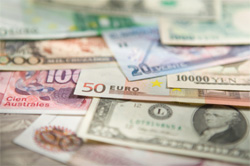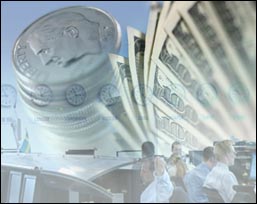Futures Trading - The Perfect Business?
Futures trading is a business that gives you everything you've ever wanted from a business of your own. Roberts (1991) calls it the world's perfect business. It offers the potential for unlimited earnings and real wealth, and you can run it working your own hours while continuing to do whatever you're doing now.
You operate this business entirely on your own, and can start with very little capital. You won't have any employees, so you wouldn't need attorneys, accountants, or bookkeepers. In fact, although you'd be buying and selling the very necessities of life, you never even carry an inventory.
What's more, you'd never have collection problems because you won't have any "customers," and since there is no competition, you won't have to pay the high cost of advertising. You also won't need office space, warehousing, or a distribution system. All you need is a personal computer and you can conduct business from anywhere in the world.... Interested?... Please go ahead and read on!
What is a Futures Contract?
A futures contract is a standardized, transferable, exchange-traded contract that requires delivery of a commodity, bond, currency, or stock index, at a specified price, on a specified future date. Generally, the delivery does not occur; instead, before the contract expires, the holder usually "squares their position" by paying or receiving the difference between the current market price of the underlying asset and the price stipulated in the contract.
Unlike options, futures contracts convey an obligation to buy. The risk to the holder is unlimited. Because the payoff pattern is symmetrical, the risk to the seller is unlimited as well. Dollars lost and gained by each party on a futures contract are equal and opposite. In other words, futures trading is a zero-sum proposition.
Futures contracts are forward contracts, meaning they represent a pledge to make a certain transaction at a future date. The exchange of assets occurs on the date specified in the contract. Futures are distinguished from generic forward contracts in that they contain standardized terms, trade on a formal exchange, are regulated by overseeing agencies, and are guaranteed by clearinghouses. Also, in order to insure that payment will occur, futures have a margin requirement that must be settled daily. Finally, by making an offsetting trade, taking delivery of goods, or arranging for an exchange of goods, futures contracts can be closed.
Trading in futures is regulated by the Securities & Exchange Board of India (SEBI). SEBI exists to guard against traders controlling the market in an illegal or unethical manner, and to prevent fraud in the futures market.
Futures Trading
Futures contracts are purchased when the investor expects the price of the underlying security to rise. This is known as going long. Because he has purchased the obligation to buy goods at the current price, the holder will profit if the price goes up, allowing him to sell his futures contract for a profit or take delivery of the goods on the future date at the lower price.
The opposite of going long is going short. In this case, the holder acquires the obligation to sell the underlying commodity at the current price. He will profit if the price declines before the future date.
Hedgers trade futures for the purpose of keeping price risk in check. Because the price for a future transaction can be set in the present, the fluctuations in the interim can be avoided. If the price goes up, the holder will be buying at a discount. If the price goes down, he will miss out on the new lower price. Hedging with futures can even be used to protect against unfavorable interest rate adjustments.
While hedgers attempt to avoid risk, speculators seek it out in the hope of turning a profit when prices fluctuate. Speculators trade purely for the purpose of making a profit and never intend to take delivery on goods. Like options, futures contracts can also be used to create spreads that profit from price fluctuations.
Accounts used to trade futures must be settled with respect to the margin on a daily basis. Gains and losses are tallied on the day that they occur. Margin accounts that fall below a certain level must be credited with additional funds.
Settling Futures Contracts
Futures contracts are usually not settled with physical delivery. The purchase or sale of an offsetting position can be used to settle an existing position, allowing the speculator or hedger to realize profits or losses from the original contract. At this point the margin balance is returned to the holder along with any additional gains, or the margin balance plus profit as a credit toward the holder's loss. Cash settlement is used for contracts like stock index futures that obviously cannot result in delivery.
The purpose of the delivery option is to insure that the futures price and the cash price of good converge at the expiration date. If this were not true, the good would be available at two different prices at the same time. Traders could then make a risk-free profit by purchasing goods in the market with the lower price and selling in the market with the higher price. That strategy is called arbitrage. It allows some traders to profit from very small differences in price at the time of expiration.
Pricing Futures
Futures prices are presented in the same format as cash market prices. When these prices change, they must change by at least a certain minimum amount, called the tick. The tick is set by the exchange.
Prices are also subject to a maximum daily change. These limits are also determined by the exchange. Once a limit is reached, no trading is allowed on the other side of that limit for the duration of the session. Both lower and upper limits are in effect. Limits were instituted to guard against particularly drastic fluctuations in the market.
In addition to these limits, there is also a maximum number of contracts for a given commodity per person. This limit serves to prevent one investor from gaining such great influence over the price that he can begin to control it.
How Futures came into being - The History of the Markets
Along time ago, back in the days of Caesar, farmers and herdsmen needed a place to go to trade their commodities. Commodities, according to Websterís Dictionary, is any useful thing that is bought and sold as an article of commerce. So, the farmers set up a marketplace in which to trade the "commodities". That was all well and good except for the problem of timing. Unfortunately, corn and other grains only are harvested at certain times of the year while the need for these grains was consistent year-round.
The traders began making what is now called a forward contract. A forward contract in the commodities market is a contract made by two people setup for the purchase and sale of a certain amount of a certain commodity for delivery at a certain time. It is considered a forward contract because delivery of the good occurs in the future. These forward contracts allowed farmers and herdsmen to guarantee a buyer for their grains and herds at a certain price and in the time frame that they needed. This went well for a while; but, as time went on, they incurred some problems.
For example, letís say Antonious was a farmer of wheat back in the Caesarian times. And, he agreed to sell 5,000 bushels of wheat to Platius. Delivery was set for September. All is going great until a flash flood wiped out Antoniusí entire crop. September comes around and Platius approaches Antonius to collect his new wheat. Well, the price of wheat now has doubled and Antonius doesnít have any wheat. Oh, did I also tell you that Antonius skipped town. This poses a huge problem for Platius since he must now find someone else who has wheat, but also, he must pay double for it. Fortunately, this welching problem was corrected by the formation of "Guilds". The guilds were formed by the very traders using the markets. The guilds hold the entire group of users personally responsible. This allowed for confidence and insurance that the contracts made in the market would be backed by the full faith of the markets.
Upon the fall of the Roman Empire, the commodity markets followed in the same way. The "Dark Ages" brought a type of market, which had no centralized meeting place. A sort of nomadic group would travel around from village to village and buy or sell their supplies to those who needed them. Many times, traders would trick others upon the purchase of a pig. The buyer would choose the pig he or she wanted and the seller would reach under the table to grab a bag. Well, at the same time they were grabbing a bag, they would drop the pig and place a cat into the bag. What a surprise it must have been for the buyer to get home only to find out they would be the proud owner a cheap, useless cat instead of a pig. That is where the term, "Let the cat out-of-the-bag" comes from. After the dark ages, there wasnít a great deal of information recorded on the markets until the mid-1800ís.
The first futures contract (which is much like that of a forward contract) in our modern markets as we know of them today was for 2,000 bushels of corn traded in 1852. It was traded in a mid-sized town back then on the coast of Lake Michigan. Yes, that mid-sized town was Chicago, Illinois. A few years later, the Chicago Board of Trade was founded. Things havenít changed much since then. Except for the chalk boards where the prices were written upon are now digital and the telegraph has been upgraded to the telephone, everything else is pretty much the same. Today, there are many boards of trade, Chicago, Kansas City, Minneapolis, Montreal, QB; New York City, London, Hong Kong and many other cities around the world.
You may wonder why do we need the markets other than to have a place for producers and consumers of these commodities to trade. Well, the producers and consumers set up these markets to relieve themselves of the risk of losing excessive amounts of money from price fluctuation. You may ask where does the risk go? Well, the answer is the speculator. A speculator is an individual or a group of individuals that trade in the markets purely for the opportunity to make money. They are the traders that carry the risk in order to attempt to profit off it.
Futures Trading - The Perfect Business?
Futures trading is a business that gives you everything you've ever wanted from a business of your own. Roberts (1991) calls it the world's perfect business. It offers the potential for unlimited earnings and real wealth, and you can run it working your own hours while continuing to do whatever you're doing now.
You operate this business entirely on your own, and can start with very little capital. You won't have any employees, so you wouldn't need attorneys, accountants, or bookkeepers. In fact, although you'd be buying and selling the very necessities of life, you never even carry an inventory.
What's more, you'd never have collection problems because you won't have any "customers," and since there is no competition, you won't have to pay the high cost of advertising. You also won't need office space, warehousing, or a distribution system. All you need is a personal computer and you can conduct business from anywhere in the world.
Your business deals with the basic staples of everyday life: lumber, fuel, grains, meats, orange juice, sugar, cocoa, coffee, metals, currencies, and so on. Individuals, small businesses, and giant corporations use these items every day of the year, so there always is, and always will be, a need for them.
The commodities business doesn't suffer from hard times because it can flourish under any economic conditions. In fact, commodity exchanges have been thriving for centuries. Their purpose is to provide a means for the orderly transfer of commodities between buyers and sellers.
Farmers, dealers, and manufacturers use the world-wide network of commodity exchanges to reduce the risks of future price fluctuations. That's why only part of the exchange floor is devoted to cash sales of commodities for immediate delivery, and over 90% of an exchange's business is in futures contracts.
How do you fit in!
In your futures business, you buy or sell futures contracts because you expect to make a profit on the transaction.
In fact, most futures & commodities traders have no use for the actual commodities they are trading; they never even see them. They are just people like you and me; people with a certain amount of capital to invest getting started in their own business.
There are millions of them and they come from almost every profession: from clerks to executives, from janitors to doctors, from students to university presidents. It is the millions of traders controlling the millions and millions of contracts that allow the exchanges to exist.
But more than that, we make it possible for farmers, dealers, and manufacturers to reduce their own risks. For performing this service, we expect to make a profit.
The great thing about all of this is that you don't need a college degree or even a high school education to do well trading futures. However, you do need some training, you need an objective system, and you need a plan.
BEGINNERS GUIDE TO FUTURES
_________________________________________________________



----------- EDUCATION ---------
-------TRADING METHODS ------
--------- FOR TRADERS ---------
-------------- OTHER ------------

_________________________________________________________________________________________________________________________________________
Do you like fx1618?
If you think fx1618.com is cool and want to help fx1618, please tell your friends about it via email and blog (or forum)
